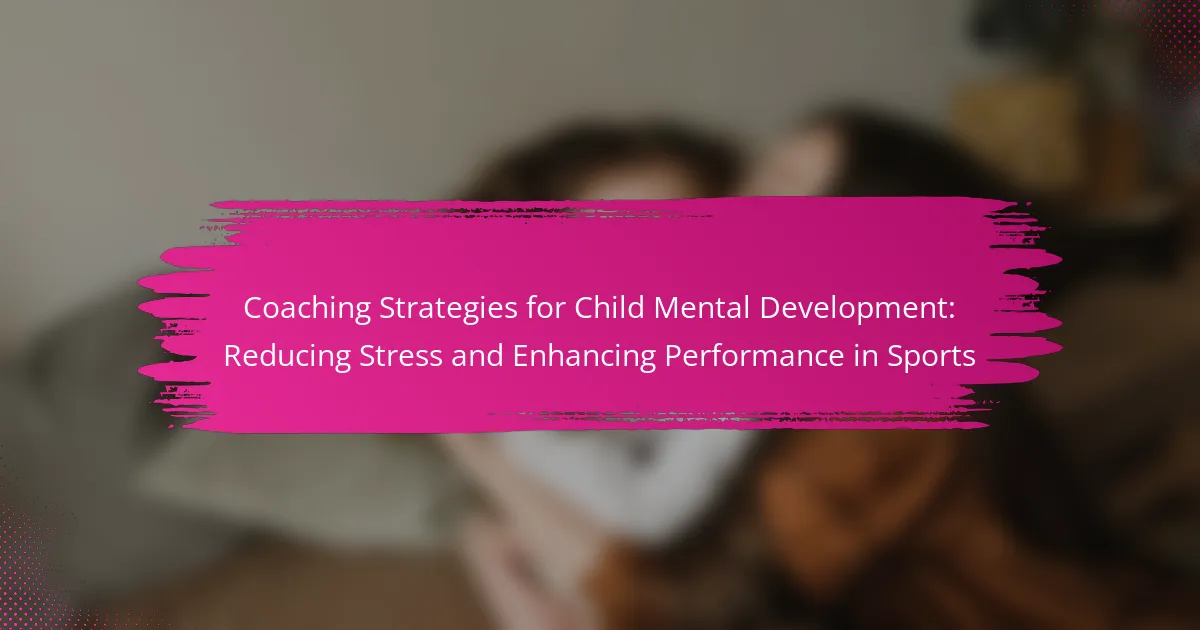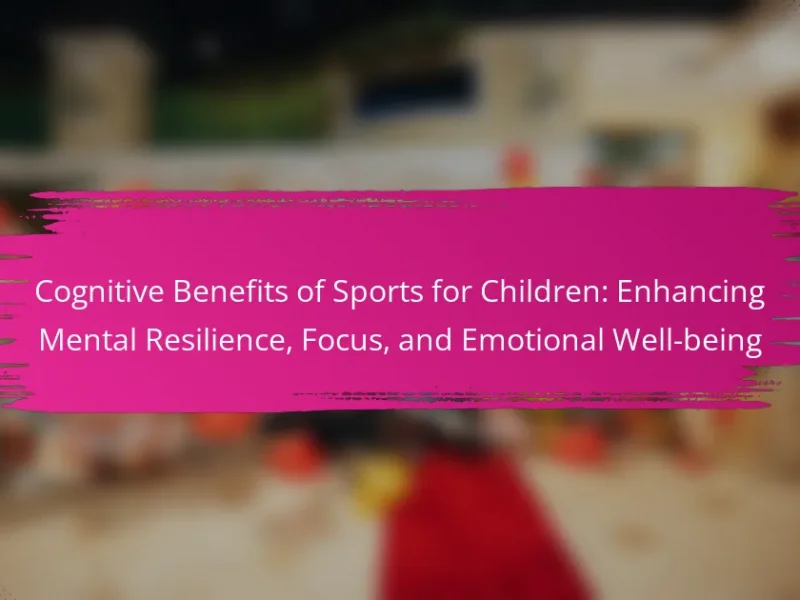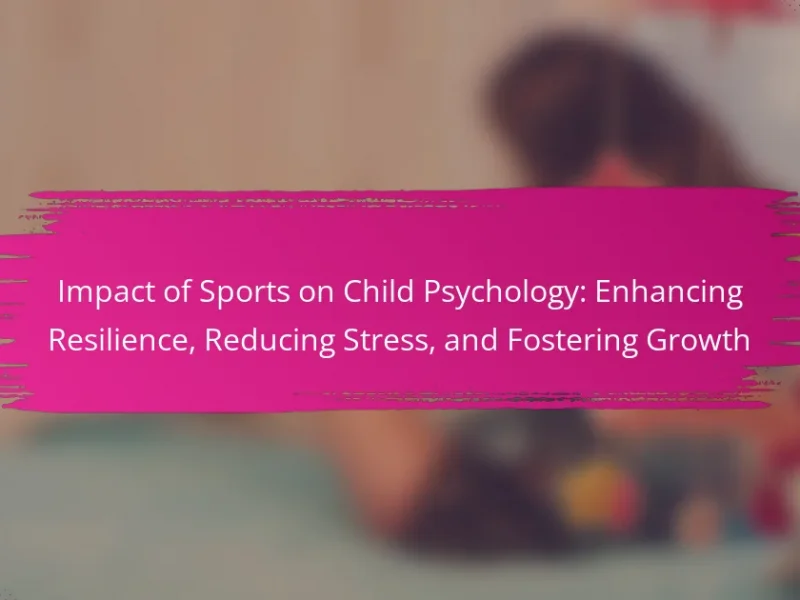Coaching strategies for child mental development can significantly reduce stress and enhance performance in sports. Effective techniques include fostering a positive environment, setting achievable goals, and teaching stress management skills. Incorporating mindfulness practices and encouraging open communication are essential for building resilience and confidence. Involving parents in the coaching process further supports children’s overall growth and athletic performance.
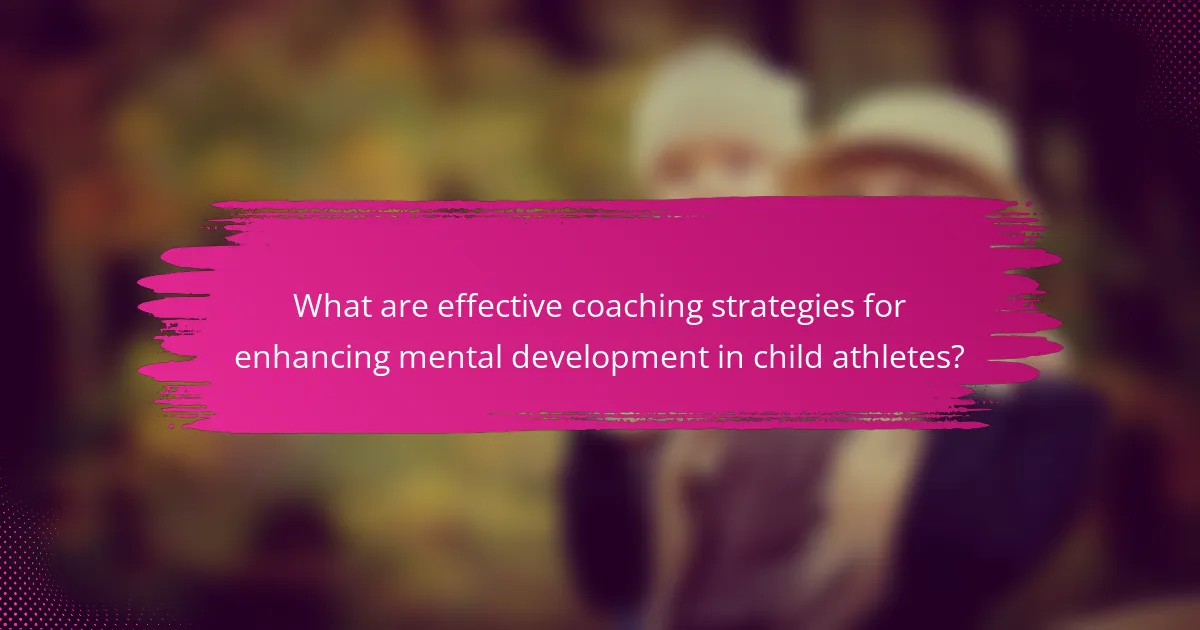
What are effective coaching strategies for enhancing mental development in child athletes?
Effective coaching strategies for enhancing mental development in child athletes focus on building resilience and confidence. Techniques include fostering a positive environment, setting achievable goals, and teaching stress management skills.
Coaches should implement regular feedback sessions to reinforce progress and promote a growth mindset. Encouraging teamwork and communication enhances social skills, which are crucial for overall development.
Incorporating mental exercises, such as visualization and mindfulness, can significantly improve focus and performance under pressure. These strategies not only enhance athletic abilities but also contribute to personal growth.
Finally, involving parents in the coaching process helps create a supportive network, further boosting the child’s mental development and athletic performance.
How does emotional intelligence impact performance in youth sports?
Emotional intelligence significantly enhances performance in youth sports by improving communication, teamwork, and resilience. Coaches who integrate emotional intelligence strategies can better support young athletes in managing stress and developing mental skills. Research shows that athletes with high emotional intelligence demonstrate improved focus, motivation, and adaptability during competitions. This unique attribute fosters a positive environment, promoting both individual and team success.
What role does positive reinforcement play in reducing stress?
Positive reinforcement significantly reduces stress by promoting a supportive environment that fosters confidence and motivation in children. This approach encourages positive behaviors through rewards, leading to improved mental resilience. Studies show that children receiving consistent positive feedback experience lower anxiety levels during sports activities. By recognizing achievements, coaches can enhance a child’s performance while simultaneously alleviating stress. This dual benefit makes positive reinforcement a vital coaching strategy in child mental development.
What are the best practices for implementing positive feedback?
Positive feedback should be specific, timely, and focused on effort and improvement. This approach enhances a child’s mental development by reinforcing positive behaviors. Use examples to illustrate desired actions, ensuring clarity in communication. Regularly incorporate feedback during practice sessions to build confidence and reduce performance anxiety. Foster an environment where children feel safe to express themselves and learn from mistakes, promoting resilience and growth.

What universal attributes contribute to reducing stress in child sports?
Effective coaching strategies that focus on child mental development can significantly reduce stress in sports. Key universal attributes include fostering a supportive environment, emphasizing skill development over competition, and encouraging open communication.
A supportive environment helps children feel safe, promoting confidence and reducing anxiety. Emphasizing skill development allows children to focus on personal growth rather than external pressures. Open communication encourages children to express their feelings, alleviating stress and enhancing their overall experience in sports.
These attributes contribute to a holistic approach, ensuring children enjoy their sports involvement while developing essential life skills.
How can structured routines benefit young athletes?
Structured routines significantly benefit young athletes by reducing stress and enhancing performance. These routines provide consistency, which fosters a sense of security and control. As a result, athletes can focus better on their training and competitions.
Additionally, structured routines help in developing discipline and time management skills, crucial for balancing sports with academic responsibilities. Research indicates that young athletes with established routines experience lower anxiety levels and improved concentration during practice and events.
Furthermore, these routines can include physical warm-ups, mental preparation techniques, and post-activity recovery strategies, all tailored to individual needs. This holistic approach not only enhances athletic performance but also supports overall mental development.
What is the significance of team dynamics in mental development?
Team dynamics significantly influence mental development in children by fostering collaboration and communication. Positive interactions among team members enhance emotional resilience and social skills. Effective coaching strategies that prioritize team cohesion can reduce stress and improve performance. Research indicates that children in supportive team environments show greater confidence and motivation, leading to better overall mental health outcomes.
How does physical activity correlate with mental well-being?
Physical activity significantly enhances mental well-being by reducing stress and improving mood. Regular exercise releases endorphins, which are natural mood lifters. Studies show that children engaged in sports exhibit lower anxiety levels and improved self-esteem. Additionally, physical activity fosters social connections, further contributing to emotional resilience. Coaching strategies focusing on fun and teamwork can amplify these benefits, promoting a positive mental state in young athletes.
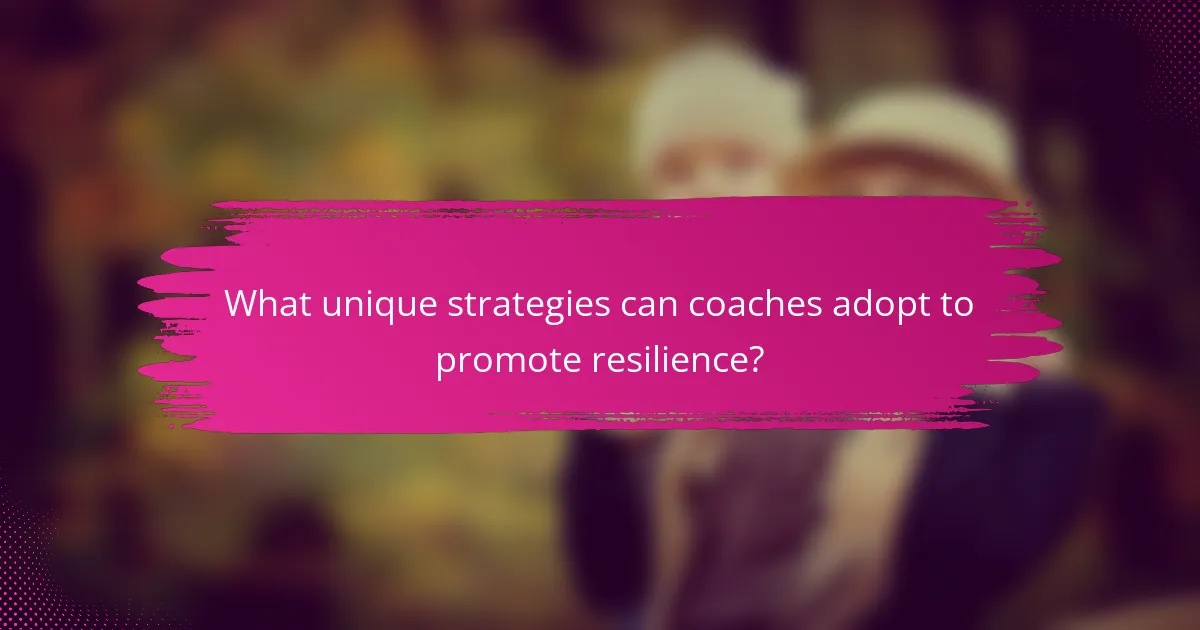
What unique strategies can coaches adopt to promote resilience?
Coaches can adopt unique strategies to promote resilience by fostering a growth mindset, encouraging goal-setting, and implementing mindfulness practices. These approaches help athletes manage stress and enhance performance.
Fostering a growth mindset involves teaching athletes that challenges are opportunities for development. This perspective can significantly improve their ability to cope with setbacks.
Encouraging goal-setting allows athletes to focus on achievable objectives, which boosts motivation and resilience. Specific, measurable goals help track progress and build confidence.
Implementing mindfulness practices, such as meditation or breathing exercises, equips athletes with tools to manage anxiety and maintain focus during competitions. This unique strategy enhances emotional regulation and overall performance.
How can visualization techniques enhance performance?
Visualization techniques can significantly enhance performance by improving focus and reducing anxiety. Athletes who regularly use visualization report increased confidence and better execution of skills during competition. This mental rehearsal allows children to mentally practice scenarios, leading to improved decision-making and stress management in high-pressure situations. Studies show that athletes using visualization techniques can experience up to a 45% improvement in performance metrics, demonstrating its effectiveness in sports coaching for child mental development.
What are the benefits of goal-setting for child athletes?
Goal-setting for child athletes enhances focus, builds confidence, and improves performance. These benefits foster a positive mindset and resilience in sports. Setting specific, achievable goals encourages children to track progress, leading to increased motivation. As a result, young athletes experience reduced anxiety and enhanced enjoyment in their activities.
What guidelines should coaches follow for effective goal-setting?
Coaches should follow SMART criteria for effective goal-setting: Specific, Measurable, Achievable, Relevant, and Time-bound. This framework enhances clarity and focus in child mental development.
1. Specific: Define clear goals to direct efforts.
2. Measurable: Establish criteria to track progress.
3. Achievable: Set realistic goals to maintain motivation.
4. Relevant: Align goals with individual capabilities and interests.
5. Time-bound: Set deadlines to foster commitment.
By adhering to these guidelines, coaches can effectively reduce stress and enhance performance in sports.

What rare attributes should coaches be aware of in child mental health?
Coaches should be aware of rare attributes such as emotional resilience, social adaptability, and cognitive flexibility in child mental health. These attributes significantly influence a child’s ability to cope with stress and perform in sports. Emotional resilience allows children to bounce back from setbacks, while social adaptability helps them navigate team dynamics. Cognitive flexibility enhances their problem-solving skills during competitions. Recognizing these attributes can lead to tailored coaching strategies that foster overall mental development.
What are the signs of anxiety in young athletes?
Young athletes may show signs of anxiety through physical, emotional, and behavioral changes. Common indicators include increased heart rate, sweating, and fatigue. Emotionally, they might exhibit irritability, mood swings, or withdrawal from teammates. Behaviorally, signs can manifest as reluctance to participate, avoidance of practice, or changes in performance levels. Recognizing these signs is crucial for coaches to implement effective strategies that support mental health and enhance athletic performance.
How can mindfulness practices be integrated into training?
Mindfulness practices can be integrated into training through structured routines and exercises. Incorporating breathing techniques before sessions helps athletes focus and reduce anxiety. Mindfulness meditation can enhance awareness of thoughts and feelings, improving emotional regulation. Coaches can also implement short mindfulness breaks during practice to foster mental clarity and resilience. Regular practice leads to improved performance and reduced stress, benefiting child mental development in sports.
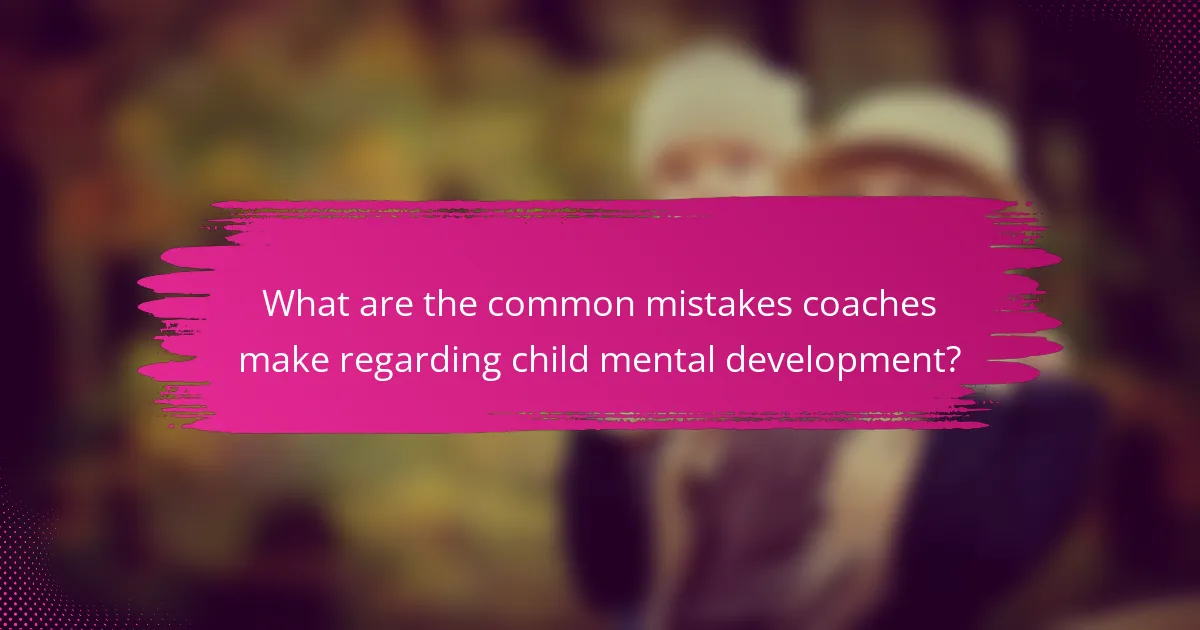
What are the common mistakes coaches make regarding child mental development?
Coaches often make several common mistakes that hinder child mental development. They may prioritize winning over personal growth, leading to increased stress. Additionally, they might fail to recognize individual differences in emotional and cognitive maturity, applying a one-size-fits-all approach. Overemphasis on competition can diminish enjoyment and intrinsic motivation. Lastly, neglecting to foster a supportive environment can prevent children from developing resilience and coping skills.
How can coaches avoid overemphasis on winning?
Coaches can avoid overemphasis on winning by prioritizing skill development and personal growth. Fostering a positive environment encourages athletes to focus on their improvement rather than solely on outcomes. Emphasizing teamwork and effort cultivates resilience and builds confidence. Regular feedback on performance, rather than results, helps athletes appreciate their progress. Additionally, setting realistic goals aligned with individual capabilities supports a healthy mindset in sports.
What strategies can mitigate burnout in young athletes?
To mitigate burnout in young athletes, coaches should implement supportive strategies that prioritize mental well-being. Creating a balanced training schedule allows for adequate rest and recovery, essential for maintaining motivation. Encouraging open communication fosters trust, enabling athletes to express concerns. Incorporating fun and varied activities can enhance engagement and reduce pressure. Additionally, setting realistic goals helps athletes focus on personal growth rather than competition. Regularly assessing mental health through check-ins can identify signs of stress early, allowing for timely interventions.

What actionable tips can coaches implement immediately?
Coaches can implement several actionable tips immediately to enhance child mental development in sports. Focus on creating a supportive environment that encourages open communication. Incorporate mindfulness techniques to help children manage stress effectively. Establish clear, achievable goals to foster a sense of accomplishment. Use positive reinforcement to build confidence and resilience. Finally, integrate fun and engaging activities to maintain motivation and interest in the sport.
How can coaches create a supportive environment for mental growth?
Coaches can create a supportive environment for mental growth by fostering open communication, encouraging resilience, and promoting a positive mindset. Establishing trust allows athletes to express concerns and seek guidance. For instance, coaches can implement regular check-ins to discuss mental well-being, which enhances emotional safety and reduces stress.
Additionally, utilizing techniques such as visualization and mindfulness can help athletes manage anxiety and improve focus. Research indicates that athletes who engage in mental training show enhanced performance and reduced stress levels. By prioritizing mental development alongside physical training, coaches contribute to holistic athlete growth.
What resources are available for continuous coach education on mental health?
Coaches can access various resources for continuous education on mental health. Online courses, workshops, and webinars focused on child mental development are widely available.
Organizations like the National Alliance on Mental Illness (NAMI) offer training programs. The American Psychological Association (APA) provides guidelines and resources tailored for coaches. Additionally, sports associations often host seminars to enhance mental health awareness.
These resources emphasize strategies to reduce stress and enhance performance in sports. Continuous education is vital for coaches to support young athletes effectively.
